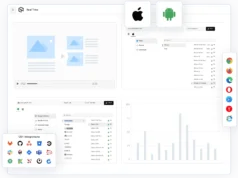
Let us guess, you either have a website that you want to move to another server or you’re about to build a website and you’re pondering the options? Are we close?
Well, whether we’re right or you’re just researching for a school paper, one thing’s for certain – you’re interested in hosting. More precisely, free and offshore hosting, what they have or don’t have in common, and all that jazz, right?
If you said yes, strap in and enjoy the ride, and if you said no – ask yourself this – do you really have a better way to spend seven minutes? Didn’t think so. Enjoy!
What Is Free Hosting?

To put it simply, free hosting is when a company provides you with server space for your website without charging you any money. That’s right – free as in gratis, no strings attached, no charge whatsoever. Of course, nothing in life is ever completely free – there are always going to be some kind of limitations, and free hosting is no different.
So, what’s the catch? Well, ads… What else could it be but those pesky, ever-annoying ads? Free hosting providers will place ads on your website – after all, that’s how they make their money and keep the lights on. The good news is that you usually have some control over what kind of ads are displayed, but the bad news is that they’re still going to be there, staring you in the face each time you open your website.
But, you can’t really be mad, can you? After all, you’d run ads on your own website for that AdSense check every month, wouldn’t you?
What Is Offshore Hosting?

Offshore hosting is pretty much what it sounds like – it’s hosting your website on a server that’s located in a country other than your own. The most popular choice for this is to go with a server that’s located in a country with more lenient laws when it comes to freedom of speech and expression. This way, you can avoid any potential censorship from the government.
What we mean by that is, let’s say you have an affiliate website about CBD and all related products. Do you think that would fly on a Middle Eastern server? No. Of course, not. You’d probably end up with more problems than you can handle (to put it mildly).
The other big advantage of offshore hosting is speed. If you have a website that’s targeting a global audience, then it only makes sense to host it on a server that’s either close to where most of your visitors are coming from or the one with the best bandwidth. This way, they won’t have to deal with any lag when trying to access your site.
So, what’s the catch here? Well, there isn’t one. It’s just that you have to pay for it. But, when you take a look up more info on what you’re paying for – you won’t mind spending a few bucks.
What Are Their Similarities And Differences?

The main similarity between free and offshore hosting is that they’re both options for hosting your website. The main difference is that one is free (with some limitations) and the other one you have to pay for.
As for the differences, well, there are plenty. Starting with the fact that free hosting providers will place ads on your website, while you won’t have to deal with that if you go with offshore option. Offshore hosting is also a lot faster and more reliable, less prone to failures etc.
Now, we know it seem obvious which one’s better, but “better” isn’t always more suitable, so, hold your horses for now.
What Are The Benefits Of Free Hosting?

The obvious benefit is that it’s free, but let’s look past that for a second.
One big advantage is that it’s a great way to test out your ideas without having to spend any money. If you’re not sure whether your website is going to be a success or not, then free hosting is a great way to find out without breaking the bank.
Another big advantage is that it’s perfect for small websites with low traffic levels. If you don’t think you’re going to get much traffic, then there’s no point in paying for a hosting plan with unlimited bandwidth and storage space – you’re just wasting your money.
Finally, it’s worth mentioning that some free hosting providers do offer a decent level of service. They might not be the best out there, but they’re certainly not the worst either. So, if you do your research, you might be able to find a free host that’s actually worth using.
What Are The Benefits Of Offshore Hosting?

The main advantage of offshore hosting is that it gives you a lot more freedom, peace of mind and flexibility when it comes to your website. You don’t have to worry about your content, you don’t have to worry about maintenance, you don’t have to worry about downtime… You don’t have to worry about anything if we’re being completely honest.
Another great benefits that it’s a lot faster and more reliable than free hosting. You’re not sharing your server with thousands of other websites, so you don’t have to worry about your site being slow or unresponsive. Gigabits of bandwidth are there, and even if you end up craving additional juice – there’s a lot more where that came from.
In the end, if we’re being perfectly candid – offshore hosting is actually quite affordable. Sure, it’s not free, but when you compare it to the total cost (not just the financial costs) of free option, it’s actually very competitive.
Final Verdict – Which One Is Better For Me?

Not an easy choice, huh?
At the end of the day, the decision of whether to go for free or offshore hosting comes down to your specific needs and requirements. If you’re just starting out and you’re not sure whether your website is going to be a success, then free hosting is a great option.
However, if you’re serious about your website and you want to give it the best possible chance of success, then offshore hosting is the way to go. It’s more expensive, but you get what you pay for – peace of mind, flexibility, freedom and speed.
So, there you have it – everything you need to know about free and offshore hosting. We hope this article has helped you to make a decision about which option is best for you and your website. Good luck!














